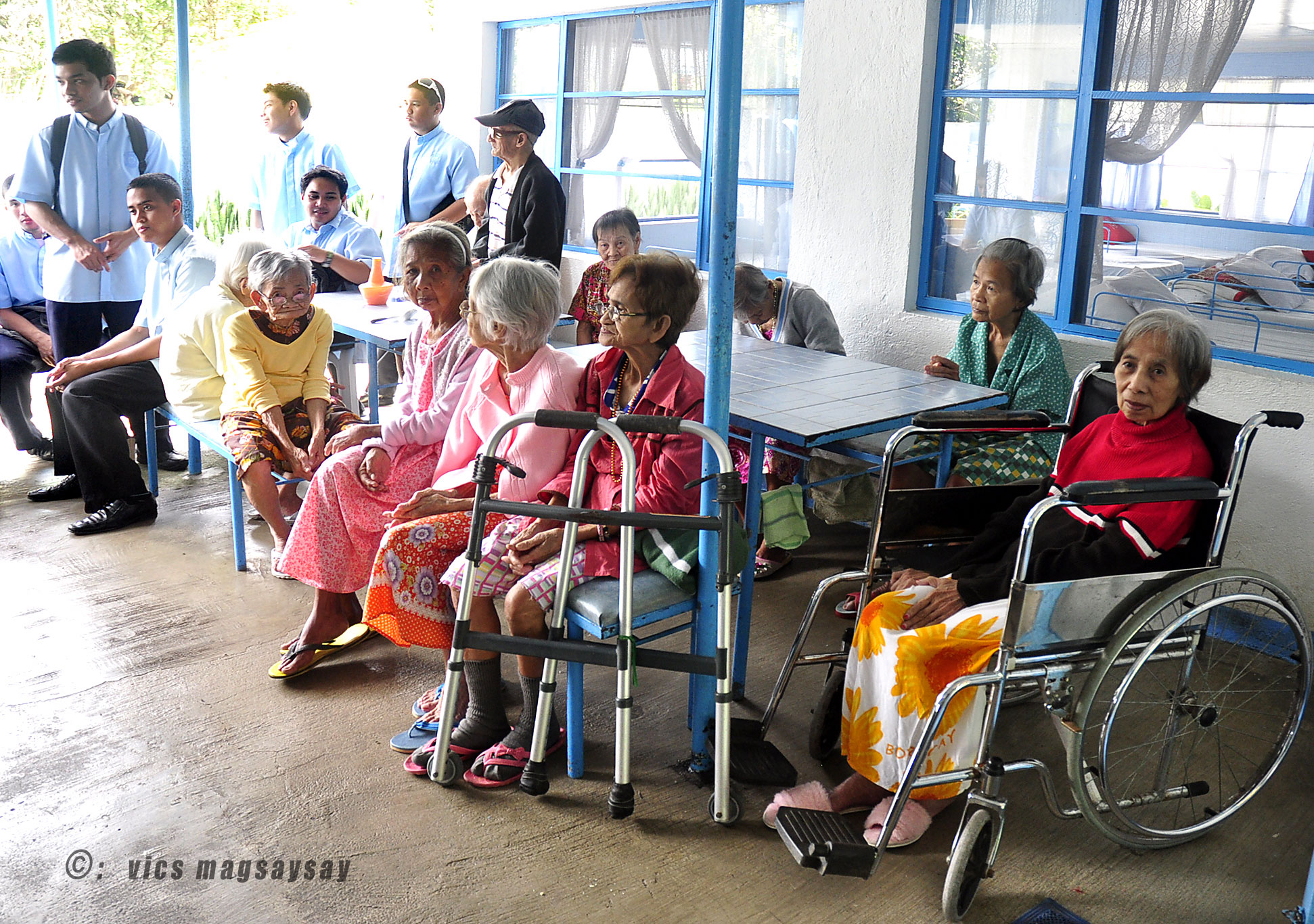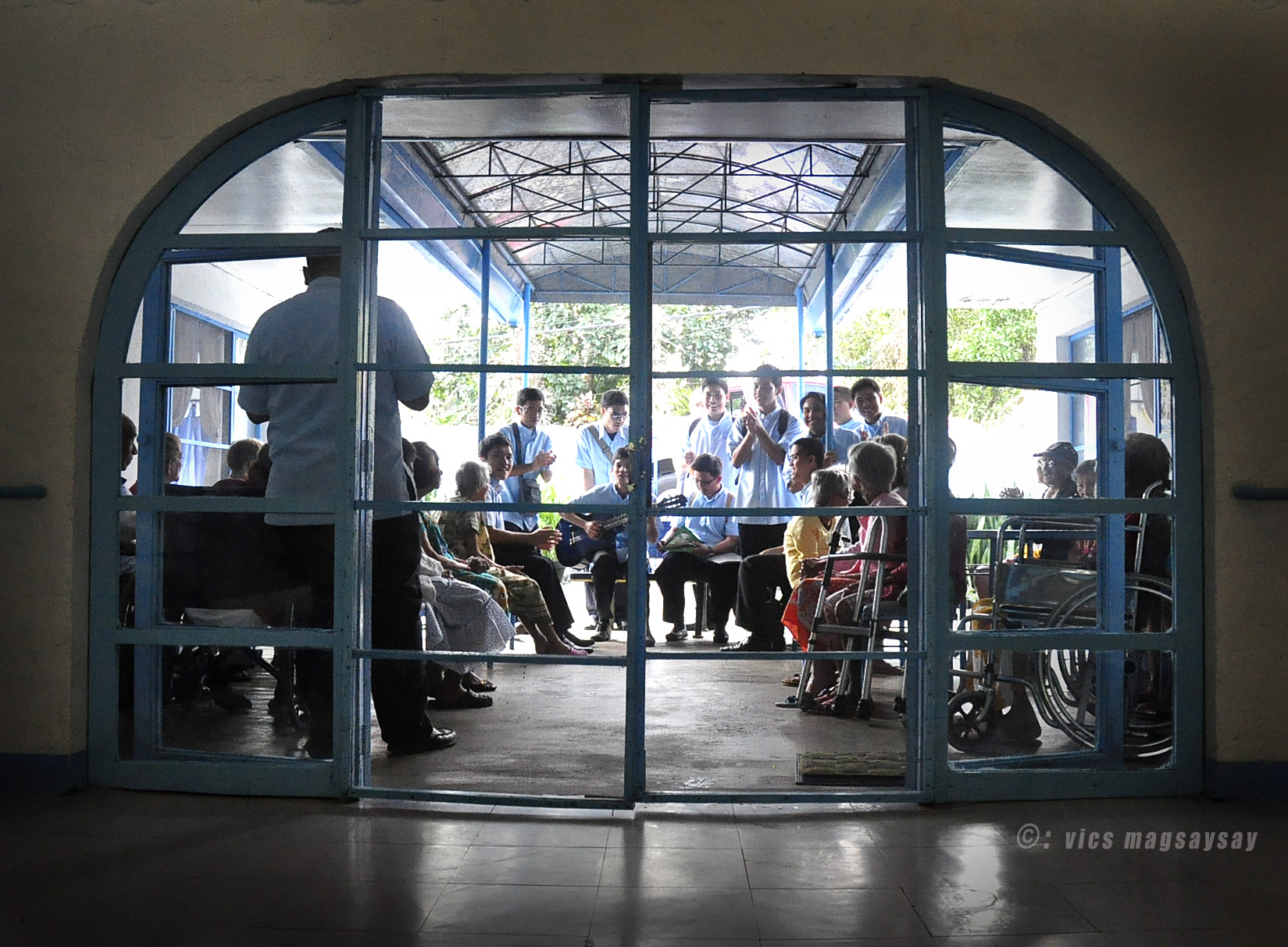Filtered By: Lifestyle
Lifestyle
A ray of care: Trip the twilight years fantastic
TEXT AND PHOTOS BY VICS MAGSAYSAY
“No act of kindness is too small. The gift of kindness may start as a small ripple that over time can turn into a tidal wave affecting the lives of many.” ~ Kevin Heath
Imagine yourself in the twilight of your years bereft of any kin, conveniences, food, roof over your head, decent clothes… and, much more serious, deprived of THE most important thing in life – love. It’s just so utterly terrible. I bet it’s just so appalling that the spirit in you is shuddering in fright or mortified as you contemplate it. What a horrible feeling, right?
In the Philippines alone there are approximately 300, 000 seniors experiencing this sorrowful plight. Multiply these numbers in other countries and that easily amounts to tens of millions of folks in the winters of their lives enduring such deplorable conditions.

The elderly residents of Sinag Kalinga.
This story started one Sunday morning when my motorcycle buddy Ken Falco and I went for a bike ride in the countryside. He lent me his classic Harley-Davidson 883 bike. Our destination was Lucban, Quezon, a two-hour bike ride south of Manila. After an exhilarating drive on the circuitous mountain road we arrived in the town, famished and cold. We consoled our hungry stomachs with yummy hot food in an eclectic restaurant in the middle of the town – Casa San Luis. It was here where we met old friends Hyacinth “Cindy” Oblea and her partner and learned what they had become very much occupied with. Without further ado, Cindy mentioned the Sinag Kalinga (Sinag means ray of light and Kalinga, care), a foundation that strives to meet the needs of marginalized elderly struggling to survive in rural communities throughout the countryside.
Not so long ago, during my visit to the Philippines, I wrote an article about caregivers in Metro Manila. After interviewing caregivers and teachers of a caregiving school there, I learned that mushrooming numbers of Filipinos who want to work abroad use this kind of diploma as a sure ticket for jobs anywhere but in their own country. Of course, a few end up stuck at home, too.
This time my report is again about the subject of caregiving. But much more than that.
Cindy told me it all started in 1993. After two years of “incubation period” as she calls it, Sinag Kalinga (SK) officially kicked off with just her and a partner. She said, “This is the only hospice in Quezon Province. As of now, we have 27 residents. The average age is 68. The oldest is 92.”
“There are around 300,000 dejected elderly people in the country. Some of them have children or grandchildren but, due to dire poverty,they are forced to look for work and leave the elderly behind. You will find them living under bridges. Some of these abandoned folkscan be seen in the markets searching for scraps of food in order to survive. Where do they sleep? Some we found in doghouses, under coconut trees, on cold pavements or beside banana plants where they used the leaves or trunks as their blankets or pillows. Yes, they are practically everywhere but, sadly, nobody is interested in these rejected seniors. But one thing for sure is that these people cannot survive alone,” this lady managing director of SK briefed me.
I asked her how they managed to keep the wheels of the operations moving during the initial stages. Without batting an eyelash, she said, “At first, kind-hearted people helped; for example, our old friend, Ken shared some sacks of rice from his farm. Other friends who witnessed our dedication to the mission contributed this and that. It’s interesting that, through numerous donations, we were able to make both ends meet as far as the needs of these seniors were concerned. As the word spread in this town about what we were doingfor these neglected seniors in SK, more assistance poured in. Medical doctors in town shared their services and some have become our resident doctors. They selflessly give their time and talents. Even priests, nurses and caregivers assist us during their OJT (on the job training). Belongings of people who have just passed away, like clothes and wheelchairs, are donated to us, too. We even have a surplus of wheelchairs now.”
What Cindy and her team do is infectious. A week later, when we were on our way to Mauban (less than an hour's ride past and east of Lukban) from Manila, a friend of mine, who produces organic soaps for laundry and personal care, brought boxes of her products for the patients’ personal hygiene and for use in the SK facilities. Aleli Pansacola, the Daila soapmaker, was moved, too, by what these compassionate guys are doing. While the staff received Aleli’s products, we met a Balikbayan [an overseas Filipino] doctor from theU.S. sharing his medical expertise. Aside from that, he even left a significant monetary donation to the facility.
“What’s so great about SK is that, having been given a roof over their heads, decent beds to sleep, nutritious foods to eat and effective care, these poor folks are able to regain their dignity as human beings,” Cindy disclosed. “They are encouraged to take regular walks or do exercises. We even bring them to nearby resorts at least three times a year. Once, a couple, both septuagenarians, got married here. When both of them died within five years of each other, their bodies were buried together,” Cindy explained movingly.
“Seminarians sing Christian hymns; Haribon Society people chant, drum, or play guitars or percussion instruments. These guys provide healing music to mend the lingering broken spirits of the old folks. You can see the twinkle in their eyes. They felt so cared for, so loved – diametrically opposite to what they’ve experienced in the past,” she continued.

Caregivers entertain the seniors at the hospice.
Cindy cited another story: “This is cute, Vics, about the Hindus who are loaning funds to market vendors. When these vendors are not able to pay them, they ask for their equivalent amount in terms of veggies, fruits or breads. These goodies are in turn donated to our patients.”
It’s definitely hard work for the SK team, but their love and dedication to helping these elderly people carries them all on. “Laurice Belen works as a dietitian, nutritionist and caregiver rolled into one. The others, like Paul and Maan, do the same thing. No one is a specialist here. The bodies of those who pass away are cleansed here as well, since they need no more embalming and can be buried within a 24-hour period,” Cindy clarified.
The sense of caring translates to a sense of community. Our capacity to care makes life more meaningful, more significant and has the right energy to turn other people’s lives around. Caring for our seniors is perhaps the greatest responsibility for us humans. They say it is easy to love children. Even oppressors do. The milk of human kindness for the old and the helpless is in fact one of the true treasures of a culture.
For these gentle senior folks living in – and eventually leaving – Sinag Kalinga, life, without doubt, embraces this quotation of Bertrand Russel: “To be happy in this world, especially when youth is past, it is necessary to feel oneself not merely an isolated individual whose day will soon be over, but part of the stream of life flowing on from the first germ to the remote and unknown future.” - Philippine News
To send donations and support to Sinag Kaling, go to their website: www.sinagkalinga.com or send an email to contactsinagkalinga@yahoo.com
Vics Magsaysay is a Los Angeles-based writer. He is also an artist, fine art nature photographer and an alternative healer.
More Videos
Most Popular




